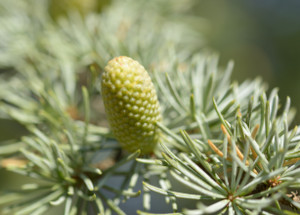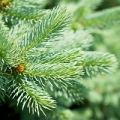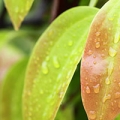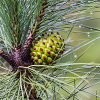Discover the Uniqueness of Atlas Cedarwood Essential Oil
 Cedar atlas essential oil is derived from the highly aromatic wood of Cedrus atlantica, and this unassuming essential oil lays claim to a notable piece of history.
Cedar atlas essential oil is derived from the highly aromatic wood of Cedrus atlantica, and this unassuming essential oil lays claim to a notable piece of history.
It is believed to be one of the very first essential oils ever to have been distilled, and ancient records show both the oil and wood were used for a wide range of purposes including incense, medicine, and cosmetics.
Cedar atlas is believed to be related to, or have descended from, the legendary Cedar of Lebanon (Cedrus libani) which is mentioned in the Bible. In fact, there are more references to cedars than any other trees in the Bible since they represented everything that was abundant and fertile.
Lebanese cedar is no longer available for the production of essential oil because during biblical times it was almost driven into extinction due to over-harvesting. The same fate may yet await C. atlantica if replanting levels are not maintained sufficiently in north Africa for essential oil production, although in recent years new plantations have been established in southern France to supply the timber.
Physical description
Cedrus atlantica is a majestic tree with a graceful habit that can reach a height of 40 and even 50 metres (130-164 ft) at maturity. It is long-lived and fast growing, bearing green-grey, needle-shaped leaves which collect in whorls in groups of 3 or 4 around stems and branches. During the summer, light green or purple coloured flowers blossom on the horizontal spreading branches, and the slow-growing male and female cones can take up to 2 years to reach maturity.
As you might expect from its name, this tree grows in the Atlas mountains of north Africa, north Algeria, and north Morocco. However, it can also be found growing in Turkey, the mountainous regions of Cyprus, and along the eastern border of the Mediterranean Sea. The majority of essential oil production takes place in Morocco.
History of cedarwood atlas
The ancient Egyptians used cedar atlas essential oil in their process of mummification as well as in their skin care preparations due to its rejuvenating properties. The wood was widely used during biblical times to build temples, ships and furniture, and was even the choice of coffin makers. Unfortunately it is quite difficult to be certain which species this ‘cedarwood’ was.
King Solomon is known to have built temples, palaces and courtyards with Lebanese Cedar, since it was believed that the fragrance stimulated the psychic centres and raised the consciousness of the worshippers in the temples. It was reported that over 90,000 trees were destroyed during his 20 year construction program. It seems quite likely that Cedrus atlantica was also used for the same purpose.
Extraction and yield
Cedar atlas essential oil is extracted by steam distilling the aromatic wood which releases a pale straw or golden coloured oil. Extraction typically produces a quite generous yield of between 2% to 4% essential oil. The fragrance is quite distinctive, and has a slightly sweet, woody and balsamic odour which is often employed as a fixative in men’s fine fragrances.
Classed as a base note, cedar atlas blends well with a wide range of other essential oils, particularly clary sage, cypress, jasmine, juniper berry, lavender, rosewood, rose, vetiver and most citrus oils. Although the resulting fragrance would not be the same, it could be used to replace sandalwood in many relaxing recipes due to its de-stressing and relaxing action.
Cedar atlas essential oil benefits
Cedar atlas essential oil has a relaxing effect on the mind whilst bringing a stimulating and strengthening action to the body. It also has an effective antiseptic and astringent action that can be used to great effect in skincare for acne, spots, and for soothing eczema, psoriasis, and dermatitis.
Used in massage, cedar atlas essential oil also helps ease pain and increase joint mobility for sufferers of arthritis and rheumatism, as well as easing general muscular aches and pains. It is also helpful as a diuretic and for treating cellulite. Cedar atlas makes a useful inhalant oil for all types of respiratory conditions, coughs and colds, and as a general decongestant.
As part of your regular haircare regime this oil can help to control dandruff and keep the hair in excellent condition, and a blend of rosemary and cedar atlas oils added to a fragrance-free shampoo and/or conditioner base will give your tired, lifeless hair a real boost. In recent research it was discovered that when blended with lavender, white thyme and rosemary, cedar atlas essential oil was found to be an effective remedy for Alopecia areata which is a form of hair loss.
Due to the conflicting information currently available regarding the alleged abortive properties of cedarwood atlas oil, it would perhaps be prudent to avoid its use during pregnancy until more accurate information becomes available.
Copyright © Quinessence Aromatherapy Ltd 2011.
































